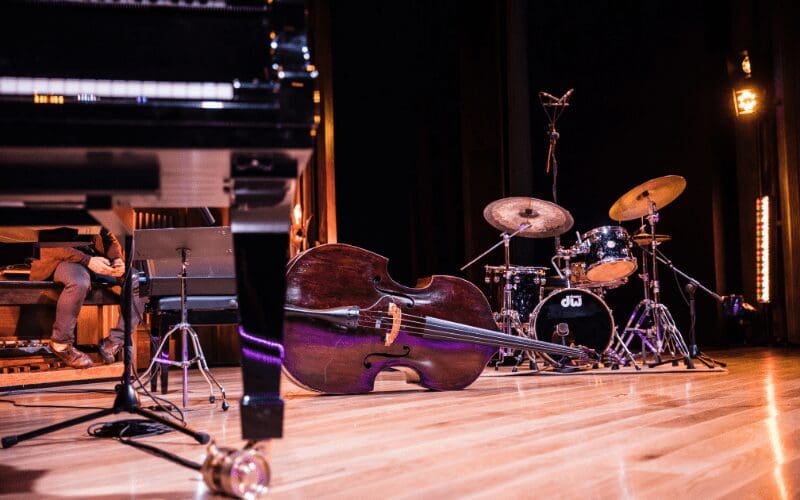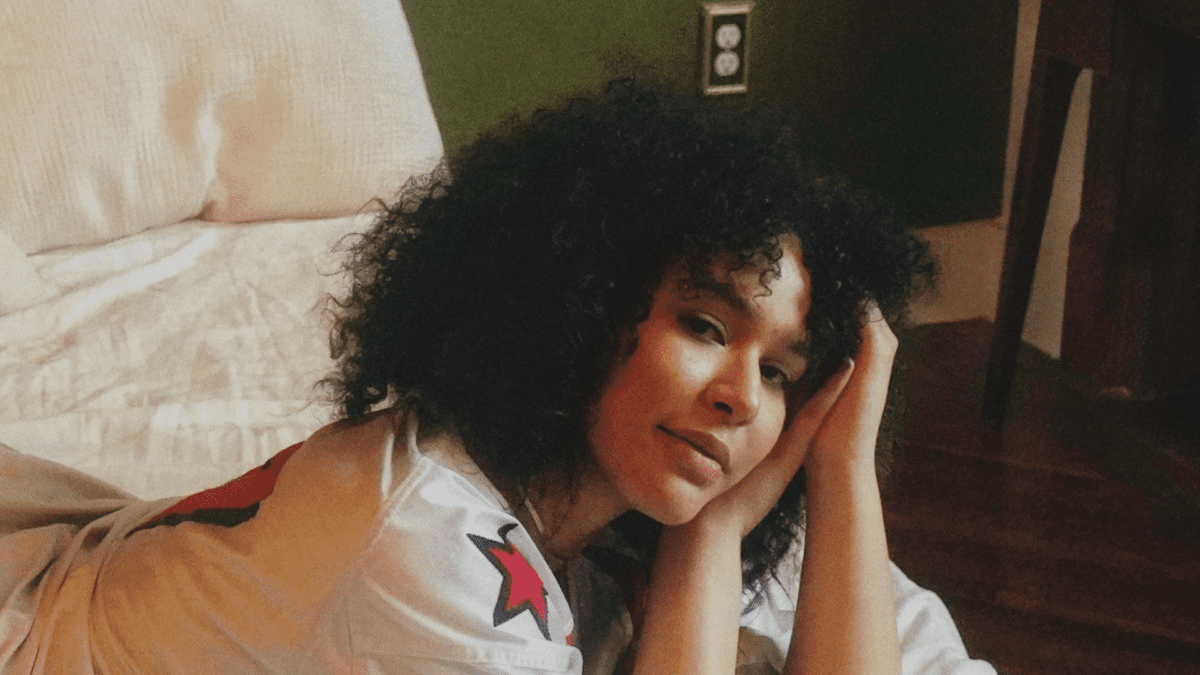In this article, we’re going to discuss what it takes to become a wedding singer or function band. We’ll cover everything from what equipment you need, to what you should wear and what you can charge.

Have you ever been interested in making some money as a singer at peoples weddings? Then you need to read this article! Stay tuned for everything you need to know.
What Is A Wedding Singer?

A wedding singer is somebody that sings at weddings. As one of the most important days of many people’s lives, weddings in Britain have become huge and costly affairs in recent years.
Typically, the day will end with music and dancing. This is often the part of the day guests remember the most. It’s your job to send them home tired and happy.
Being able to deliver that experience for people is one of the most rewarding things you can do as a musician.
Wedding Singer – What Equipment Do I Need?

The ideal wedding singer or wedding band should be entirely self-sufficient.
A wedding day can happen in all sorts of locations. Most of which don’t have their own PA/backline systems or stage lights.
If your client has a choice between someone with their own equipment or someone who requires them to hire some, they’re going to go with the simpler option.
PA System
The bare minimum you need is a PA system capable of playing to a room of about 200 people.
This would typically consist of a mixing desk with enough channels for any instruments and AUX cables for backing tracks that you may need, two speakers, and the leads required to power it all.
If you’re playing with a band, you may also wish to acquire at least one subwoofer to get a more powerful bass response.
If you’re buying brand new equipment, you should expect to pay at least £150 for an eight-channel mixing desk. Along with £300-400 per speaker, £100 for a microphone, and at least £75 for cables and stands.
As always, the second-hand market may help you find things a little cheaper.
Stage Lights
There are several other things that may make you more desirable to a client. The next most important being stage lights.
The bare minimum lighting you’ll need is enough to illuminate you and your bandmates. So, the bigger your band, the more you’ll need. However, it also creates a great atmosphere if you have lights to aim at the dancefloor too.
People are all basically magpies after two pints. Some pretty lights on the floor can make all the difference in encouraging people to get up and dance.
Stage lights are no longer as cumbersome and expensive as they used to be. A set of four LED Par Can Lights with a stand can be bought brand new for around £80. Two of these should be enough to get most acts started.
DJ vs Live Music
Finally, one decision couples find tricky is choosing between a DJ and live music. Few couples can afford both, and both come with advantages and disadvantages.
Whilst live music is more engaging than a DJ, it can only be performed for a couple of hours in any given evening. Leaving lots of quiet time in between sets.
A DJ, by contrast, can play songs all night long. So, having the ability to play recorded music, either from a playlist or with DJ equipment of your own, has now become the standard for wedding singers and wedding bands.
This allows you to get a well-earned break in between sets, without too big of a drop in the atmosphere of the evening. A laptop or tablet with an AUX cable should be sufficient to provide this. However, DJ software such as Virtual DJ can allow you to mix tracks, match tempos and give the audience a more fluid experience.
Wedding Singer – What Should My Set List Look Like?

So, this is a big one, and there isn’t a one size fits all answer here. In terms of style, you have a couple of options.
You can go down the ‘standard’ route of playing a mixture of rock, pop, and soul songs picked from between 1950 and today. There are hundreds of bands and singers doing this, so it’s tough to stand out. But, it’s also hugely popular because wedding guests range from small children to grandparents, and everybody likes to hear music they recognise.
The other route is to offer something more niche. Like a ceilidh, or reworking popular songs into a swing or funk style, or Gregorian chant music. This has the advantage of letting you carve out a niche in which you’ll have far fewer competitors. However, you will also appeal to a far narrower base of clients.
With this in mind, the three things you want to do are look at your own abilities, musical interests and also look at your local competitors. Every wedding musician has a website of some sort, and you can get an idea of what the popular ones near you are offering.
Take a look at their set lists to see what songs they do, and look at their videos to see how they do them. Consider what you can do to stand out here. Lots of people do still want to hear Mr. Brightside and Mustang Sally, but there’s a real trend around trying to have a wedding that’s ‘different’ from everyone else’s at the moment.
If you can also offer something nobody else is doing, you’ll have an edge among certain clients. The wedding market is very crowded. But that doesn’t mean there aren’t opportunities to be had.
Wedding Singer – How Many Songs Should You Perform?

In terms of how many songs you should perform, broadly speaking, you need at least two hours of material.
That’s roughly 36 songs. But you’ll also want a couple of encore tracks in the back pocket for the end of the night.
I wouldn’t even consider advertising your services until you can get 40 songs together. In practice, you’re going to need a lot more than that.
Different people have different tastes in music. Wherever you’re listing yourself, your repertoire is one of the first things a client will search through.
Aim to have 100 songs that you can perform confidently, and keep adding to that list all the time. You should also be prepared to learn songs for first dances and other key parts of the day should you be required to.
With this, I always find it’s best to be honest about what you can and can’t do. If a song is beyond your abilities for any reason you are far better off turning down the job. Instead of performing badly and getting a poor review. This will harm you much more in the long run.
What Should I Wear?

The answer to this one changes all the time. It used to be that wedding musicians were expected to perform in suits. Later on, a shirt and tie were the standards. Recently, a more casual look has become common.
The first thing to remember is that you don’t want to look out of place at the event you’re playing. So, even when setting up you should at least stick to ‘nightclub rules’. With the bare minimum being a buttoned shirt and no trainers!
If you’ve decided to go down a more niche musical route, the style of music you play may well decide your dress for you. A folk band will probably lean towards lots of tweed, flat caps, waistcoats, and so on. Whereas a band playing mostly rock music from the early 2000s may wish to adopt the skinny jeans and chequered shirts aesthetic from that time period.
It’s also worth remembering the unwritten rules you’d follow if you were a wedding guest. Particularly not wearing something that might upstage the bride, and obviously avoiding white where possible.
Obviously, comfort is important too. If you’re a lively performer you’re going to want something you can move around and get a little sweaty in. So, good breathable materials like cotton are a good place to start.
How Do I Get Bookings As A Wedding Singer?

So you’ve got the gear, the set list, and the clothes… but no gigs!? There are a few ways to get your first bookings, and a full diary comes from embracing several of them in tandem.
Which ones you put the most effort into depends on where your individual strengths lie.
Website
This is probably the first thing you thought of when you were considering how to promote yourself. They’re incredibly easy to build yourself these days. They are also a great way to show off what you’re good at and direct your clients to contact you.
The downside is that it’s just as easy for everyone else to build one too! Putting the work into learning SEO and getting your site to rank highly for the local area is a tough road.
If you have the knowledge or don’t mind putting the hours in to learn how to get a website to rank highly, then it’s a great way of promoting yourself. If you aren’t so keen to put in the constant maintenance then it can still be a useful thing to have. In combination with a business card that directs people to your site.
Remember, you can use our Showcase Page to build your own artist website!
Agencies
An age-old model, but one that still works well. Agencies will take on a certain number of wedding singers in different areas and promote them to people that make enquiries with them.
This has advantages for both you and the clients. For you, it takes the stress out of finding clients, as the agency puts all the work into raising their own profile. It also narrows the competition as well.
People like to use agencies because it gives them a single place they can go to browse through several acts that have been pre-approved by someone ‘in the know.’ This means that they’ll be choosing between you and maybe four or five similar local acts. Rather than hundreds!
However, it does raise the cost for the client because the agency’s fee is added on top of yours. In order to get listed with an agency, you’ll need a couple of good videos, recordings, and some decent quality promotional photos.
When signing up with agencies, you’ll be required to come up with a new name for yourself. This is so that you can’t be directly contacted by clients to cut out the agency’s fee.
You’ll also be expected to refer customers back to the agent if you are offered repeat work as a result of an agency-booked gig. So, you do lose a little independence going this way. But it can help fill the diary so don’t discount it!
Some good agencies to approach include: Warble, Entertainment Nation, Function Central, and The Alive Network.
DIY Agency/Listings Websites
Similar in a lot of ways to agencies, but the emphasis is on you to make contact with the client. There are a few of these, and they’ve become quite popular with clients in recent years. This is because they require much less effort on the part of the customer.
The basic idea is that customers post a job, such as a wedding, with a description of what they’re looking for. If you believe you’re a fit, you can send an application and they’ll choose from what’s on offer.
The fact that this heavily simplifies the process for customers means these are fast becoming the most popular way of finding live music. The model varies from business to business.
Some, like Addtoevent, get you to pay a small amount for each application you send off or charge a subscription-like Last Minute Musicians. Whereas others like Poptop or Encore charge a commission from whichever musician successfully gets the contract.
In each case, work out what you want to earn and be sure that the fee is added on top of your quote. You don’t want to undercut yourself. It’s the customers that are paying for the convenience of finding a musician more easily.
Social Media
You probably don’t need me to tell you much about this one. There are dozens of articles out there about promoting yourself as a wedding singer on social media, and the same things are just as true here.
Be interesting, be engaging, post regularly, and respond quickly to comments and messages. Social media has been around long enough that you probably know by now whether this is going to be a strength of yours or not.
This is one of those things that is only worth having if you’re going to pay constant attention to it. Customers consider low-effort social media to be more of a red flag than having none these days.
So, if you’re going to have one, make a habit of posting the occasional new video, photos from your gigs, and any interesting updates you have. If you can’t make the time, it’s best not to bother at all.
At Gigs
Once you have a few, this is the easiest way to get new gigs. Even with all the videos and reviews in the world, nothing quite guarantees to a potential customer that you can do the job more than seeing you play to a packed dancefloor all night.
Remember that when booking, customers are always looking for a reason not to book. By seeing you perform, guests who have their own events coming up can see that you really can do the job well on the day. As well as envisage how you would fit into their plans.
Be sure to have some business cards on hand at every event you play. Also consider referral fees or discounts for your clients to encourage them to recommend you to their friends and family.
What Does A Wedding Musician’s Day Look Like?

During the week a lot of your time will be spent answering inquiries for future events.
This is a skill you’ll pick up as you go along. But the fundamental thing to remember is to be professional, polite and try to get a really good timeline of what their day is going to look like so you can see how you fit into it.
Most weddings follow a fairly similar pattern, so let’s take a look at the key points.
18:00
This is the usual arrival time for most events. So set off early to be sure you make it in time! It’s after the meal and speeches have ended, and just before the venue staff are about to move all the tables around to make room for the evening reception.
You can usually find a good opportunity to get in and set up your equipment at this point. While everyone else is off somewhere else having a drink and a chat and greeting the additional evening guests who are just turning up.
You’ll want at least an hour to set your equipment up and sound-check.
20:30
This is the most common time for the couples’ first dance. By this point in the evening, the bride and groom will have had an opportunity to talk to all the new guests that have arrived and they’ll be ready to kick off the evening.
The guests will probably join them on the dancefloor midway through the song, so this is a great opportunity to go straight into your first set. That way you don’t have to worry about getting people onto the dancefloor. They’re already there!
Go straight in with a great song everybody knows, and follow it with another to set a good atmosphere for the night.
I’ll say this again later, but the first songs you play and the last songs you play are the bits everyone will really remember. Put your strongest ones there and half the job is done.
21:30
End your first set. Go take a break, but keep an eye on your equipment in case some drunk uncle thinks he can have a go on your microphone!
Evening food will usually be served at this point. I’d recommend negotiating with the couple that you can have a portion because you’ll be hungry after a long drive, carrying all that equipment around, and then performing for a whole hour.
Most people are pretty happy to let you have something to eat, and they usually over-order at this point in the night anyway.
There’s no point starting your second set until everyone is done eating. Given the choice between eating and dancing, even Kevin Bacon himself would definitely choose eating!
22:30
You probably want to start your second set by this time at the latest. Or earlier if people are starting to look restless. Throughout the night people will get up and dance or go sit down and chat as it suits them.
A lot of people only ever see each other at weddings and funerals. So, you can’t take it personally if the dancefloor isn’t completely full the entire night while people catch up for a chat at the bar. But the second half of this set should be songs that people absolutely cannot bear to not dance or sing along to.
I usually find that a mixture of well-aged classics like 500 Miles by The Proclaimers or Mr. Brightside by The Killers go down pretty well at this point. Along with whatever the most popular song of the current time is.
Ending the night with a full dancefloor will make you feel great, give everybody a good time and leave you with some very happy clients.
23:30
Almost every function venue has a midnight cut-off for live music.
So, for the last half an hour play a few tunes through your PA system and pack down any equipment you don’t need for this last part of the night.
00:00
Time to shut off the music. Pack down, find either the bride or groom and thank them for having you.
Then, go home. It’s been a long day, so if your drive home is a big one, don’t be a hero.
Pull up in a service station, catch twenty minutes of sleep and get a massive coffee to see you through. It’ll be much harder to sing your next gig with whiplash!
How Much Does A Wedding Singer Cost?

Obviously you can ask for any price you want. However there are two main external pressures on what you can and can’t charge.
The first one is what any given couple is willing to pay for your services based on the quality of your marketing and promotional material and your reviews, and the second is what other musicians are charging.
The Musician’s Union recommends a minimum fee of £170.50 for functions of up to four hours. With time and a half of £63.75 per hour payable over that.
As you saw above, a typical wedding is at least 6 hours on site. So you’re looking at approximately £298 per musician.
On top of that you’re looking at either £10.50 per hour of driving, or 51p per mile, and any other travel or accommodation costs you may need to fulfill the contract.
Now You Know How To Become A Wedding Singer

So, that covers the key things you need to know to get started as a wedding singer!
As you can see, the main barrier to becoming a freelance wedding singer is the initial cost.
At around £1000 for a PA system, plus clothes and marketing, you’re looking at between five and seven gigs before you turn a profit. But, once you get over that hump it’s a great way to make a living out of music, develop your skills as a performer and get a free hog roast sandwich every weekend.
This was our guide on how to become a wedding singer! We hope that you found this article useful.
You can always get in touch with Music Gateway to help you promote and distribute your music. I’m sure once people hear you singing at their wedding, they will be talking about you no end. You never know who is in the crowd – a record producer? So, you need to ensure that your Spotify profile, social media accounts are all up to date. Get in touch and see where we can take your career!




